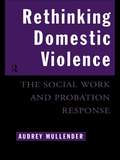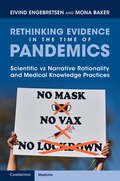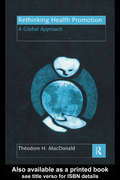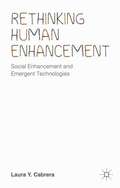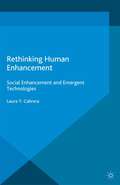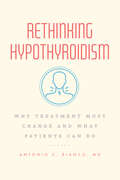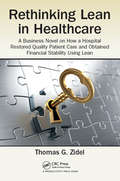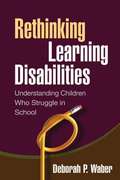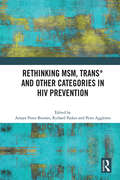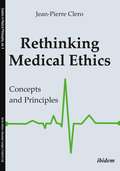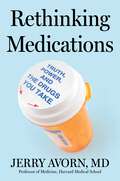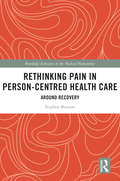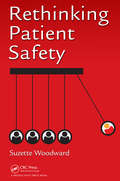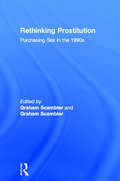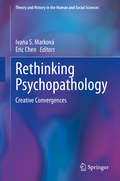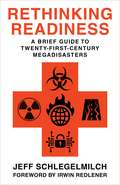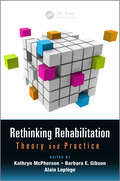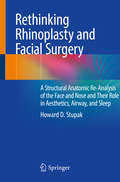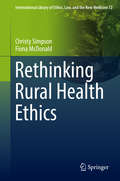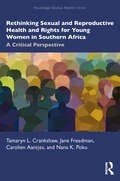- Table View
- List View
Rethinking Domestic Violence: The Social Work and Probation Response
by Audrey MullenderFirst published in 1996. Routledge is an imprint of Taylor & Francis, an informa company.
Rethinking Evidence in the Time of Pandemics: Scientific vs Narrative Rationality and Medical Knowledge Practices
by Mona Baker Eivind EngebretsenThe COVID-19 crisis has transformed the highly specialized issue of what constitutes reliable medical evidence into a topic of public concern and debate. This book interrogates the assumption that evidence means the same thing to different constituencies and in different contexts. Rather than treating various practices of knowledge as rational or irrational in purely scientific terms, it explains the controversies surrounding COVID-19 by drawing on a theoretical framework that recognizes different types of rationality, and hence plural conceptualizations of evidence. Debates within and beyond the medical establishment on the efficacy of measures such as mandatory face masks are examined in detail, as are various degrees of hesitancy towards vaccines. The authors demonstrate that it is ultimately through narratives that knowledge about medical and other phenomena is communicated to others, enters the public space, and provokes discussion and disagreements. This title is also available as Open Access on Cambridge Core.
Rethinking Health Promotion: A Global Approach
by Theodore H. MacDonaldIn today's world 'health' means far more than merely the absence of illness. In Rethinking Health Promotion Theodore H. MacDonald sweeps away the confusion surrounding the function and position of health promotion. He argues that, far from being a modern innovation, health promotion has existed as a distinct and separate enterprise for as long as biomedicine and cautions against health promotion becoming organized merely an off-shoot of medical care. Drawing on the author's experience as a World Health Organisation consultant, the book also tackles the question of whether health promotion has relevance on an international scale or whether it is purely a eurocentric phenomenon. Against this background individual chapters explore universal factors such as sexual health, diet, unemployment, alcohol and tobacco use. With its critical and historical approach this book breaks new ground in assessing health promotion and will be stimulating reading for the wide variety of students and professionals studying health promotion.
Rethinking Human Enhancement: Social Enhancement and Emergent Technologies
by Laura Y. CabreraThis book discusses three possible human enhancement paradigms and explores how each involves different values, uses of technology, and different degrees and kinds of ethical concerns. A new framework is advanced that promotes technological innovation that serves the improvement of the human condition in a respectful and sustainable way.
Rethinking Human Enhancement: Social Enhancement and Emergent Technologies
by Laura Y. CabreraThis book discusses three possible human enhancement paradigms and explores how each involves different values, uses of technology, and different degrees and kinds of ethical concerns. A new framework is advanced that promotes technological innovation that serves the improvement of the human condition in a respectful and sustainable way.
Rethinking Hypothyroidism: Why Treatment Must Change and What Patients Can Do
by Antonio C. Bianco, MDIn this primer for patients, their families, and their doctors, a leading physician and scientist explains why the standard treatment for hypothyroidism fails many—and offers an empowering call for change. Hypothyroidism, also commonly referred to as Hashimoto’s disease, affects millions in the United States alone. It occurs when the thyroid—the butterfly-shaped gland that sits in your neck right above the front of your shirt collar—malfunctions or after thyroid surgery, causing thyroid hormone levels in circulation to drop below normal. Thus, treatment is aimed at bringing these hormone levels back to normal. This is done with daily tablets of thyroxine or T4. Because hypothyroidism is so common, we likely know someone who is on this type of medication. While most patients respond well to this standard treatment, about ten to twenty percent (some two to three million individuals in the United States) are far from living a typical life. They exhibit “foggy brain”—low energy, confusion, and poor memory. Many doctors have shrugged off their complaints, believing these symptoms to be unrelated to the thyroid disease. In Rethinking Hypothyroidism, Dr. Antonio C. Bianco, a physician and a scientist who has studied hypothyroidism and thyroid hormones for decades, offers an accessible overview of the disease’s treatment and the role of big pharma in shaping it, making the case that the current approach is failing many patients. But more than this, Bianco calls for alternatives to improve lives, and he equips patients and their families with the tools to advocate for other treatments.
Rethinking Hypothyroidism: Why Treatment Must Change and What Patients Can Do
by Antonio C. Bianco, MDIn this primer for patients, their families, and their doctors, a leading physician and scientist explains why the standard treatment for hypothyroidism fails many—and offers an empowering call for change. Hypothyroidism, also commonly referred to as Hashimoto’s disease, affects millions in the United States alone. It occurs when the thyroid—the butterfly-shaped gland that sits in your neck right above the front of your shirt collar—malfunctions or after thyroid surgery, causing thyroid hormone levels in circulation to drop below normal. Thus, treatment is aimed at bringing these hormone levels back to normal. This is done with daily tablets of thyroxine or T4. Because hypothyroidism is so common, we likely know someone who is on this type of medication. While most patients respond well to this standard treatment, about ten to twenty percent (some two to three million individuals in the United States) are far from living a typical life. They exhibit “foggy brain”—low energy, confusion, and poor memory. Many doctors have shrugged off their complaints, believing these symptoms to be unrelated to the thyroid disease. In Rethinking Hypothyroidism, Dr. Antonio C. Bianco, a physician and a scientist who has studied hypothyroidism and thyroid hormones for decades, offers an accessible overview of the disease’s treatment and the role of big pharma in shaping it, making the case that the current approach is failing many patients. But more than this, Bianco calls for alternatives to improve lives, and he equips patients and their families with the tools to advocate for other treatments.
Rethinking Hypothyroidism: Why Treatment Must Change and What Patients Can Do
by Antonio C. Bianco, MDIn this primer for patients, their families, and their doctors, a leading physician and scientist explains why the standard treatment for hypothyroidism fails many—and offers an empowering call for change. Hypothyroidism, also commonly referred to as Hashimoto’s disease, affects millions in the United States alone. It occurs when the thyroid—the butterfly-shaped gland that sits in your neck right above the front of your shirt collar—malfunctions or after thyroid surgery, causing thyroid hormone levels in circulation to drop below normal. Thus, treatment is aimed at bringing these hormone levels back to normal. This is done with daily tablets of thyroxine or T4. Because hypothyroidism is so common, we likely know someone who is on this type of medication. While most patients respond well to this standard treatment, about ten to twenty percent (some two to three million individuals in the United States) are far from living a typical life. They exhibit “foggy brain”—low energy, confusion, and poor memory. Many doctors have shrugged off their complaints, believing these symptoms to be unrelated to the thyroid disease. In Rethinking Hypothyroidism, Dr. Antonio C. Bianco, a physician and a scientist who has studied hypothyroidism and thyroid hormones for decades, offers an accessible overview of the disease’s treatment and the role of big pharma in shaping it, making the case that the current approach is failing many patients. But more than this, Bianco calls for alternatives to improve lives, and he equips patients and their families with the tools to advocate for other treatments.
Rethinking Informed Consent in Bioethics
by Neil C. Manson Onora O'NeillManson and O'Neill show why informed consent cannot be fully specific or fully explicit, and why more specific consent is not always ethically better.
Rethinking Lean in Healthcare: A Business Novel on How a Hospital Restored Quality Patient Care and Obtained Financial Stability Using Lean
by Thomas G. ZidelThis book deals with a hospital's struggle to secure and maintain financial stability. In the story, the leadership team of a fictional hospital adopts the tools and principles associated with the Toyota Production System or Lean. The story takes the reader through leadership's arduous journey from rejecting the methodology to embracing it, to successful implementation. This book is important because many of our nation's hospitals are besieged with financial difficulties with declining reimbursement and the public is losing confidence in our hospital's ability to provide quality care without error. Lean can provide relief from these issues but only if it is properly implemented.
Rethinking Learning Disabilities: Understanding Children Who Struggle in School
by Deborah WaberExperts have yet to reach consensus about what a learning disability is, how to determine if a child has one, and what to do about it. Leading researcher and clinician Deborah Waber offers an alternative to the prevailing view of learning disability as a problem contained within the child. Instead, she shows how learning difficulties are best understood as a function of the developmental interaction between the child and the world. Integrating findings from education, developmental psychology, and cognitive neuroscience, she offers a novel approach with direct practical implications. Detailed real-world case studies illustrate how this approach can promote positive outcomes for children who struggle in school.
Rethinking MSM, Trans* and other Categories in HIV Prevention
by Richard Parker Peter Aggleton Amaya Perez-BrumerAs the HIV epidemic moves into its fourth decade, it is clear that the global response has failed to adequately address the needs of a wide range of vulnerable populations and groups. Chief among these are gay, bisexual and other men who have sex with men, and transgender persons, who globally face the disproportional burden of HIV infection. This volume rethinks HIV prevention and health promotion for sexual and gender minorities – in both the industrialised societies of the West, as well as in the developing nations of the Global South. The chapters it contains offer a critical analysis of past and present HIV research employing categories to designate gay and other men who have sex with men, transgender persons, and/or other persons and communities with diverse gender and sexual identities. Contributors question the politics of many of the existing classifications and categories in HIV research and argue for a more sophisticated analysis of gender and sexual diversity in order to tackle the social and political barriers that impede the design of successful HIV prevention and health promotion approaches. This book was originally published as a special issue of Global Public Health.
Rethinking Medical Ethics: Concepts and Principles (Studies In Medical Philosophy Ser. #4)
by Jean-Pierre CleroIn this unique study, Jean-Pierre Clero examines medical ethics from a philosophical perspective. Based on the thoughts of great philosophers, he develops a theory of medical ethics that focuses on the values of intimacy.
Rethinking Medications: Truth, Power, and the Drugs You Take
by Jerry AvornA leading medical expert explains why too many of the medications Americans take are poorly evaluated, overpriced, or pose unwarranted risks—and what we can do to fix that.Groundbreaking research has given us many remarkable new medicines, but America&’s drug evaluation process, once the envy of the world, is being seriously compromised. Under pressure from drugmakers, the FDA has been lowering its approval standards and has let poorly effective or risky products enter the market—while our prescription prices, the highest in the world, put crucial treatments beyond the reach of many. In Rethinking Medications, Dr. Jerry Avorn explains how we got here and what we can do to ensure that our medicines are dependably effective, safe, and affordable. Part of the problem is the power of pharma&’s biggest-in-Washington lobbying clout, which influences members of Congress from both parties. That leverage is extended by the FDA&’s growing dependence on fees the industry pays to get its drugs approved. The increasingly revenue-driven US healthcare system shapes the way doctors prescribe medications—sometimes to the detriment of their clinical decisions. Based on his decades of practice and research at Harvard Medical School and his role at the very center of many of these controversies, Dr. Avorn presents compelling clinical illustrations of these issues across the medical spectrum: from cancer drugs to opioids, from treatments for rare diseases to psychedelics. Throughout, he offers practical steps that consumers, policymakers, and practitioners can take to address these problems—at a moment when our assumptions about scientific evidence, regulation, pricing, and the role of government are being contested as never before.
Rethinking Pain in Person-Centred Health Care: Around Recovery (Routledge Advances in the Medical Humanities)
by Stephen BuetowThis book explores how person-centred health care could be refined to help persons alleviate pain-related distress and construct pain as a potentially positive experience. Rethinking Pain in Person-Centred Health Care is a fascinating contribution to the multidisciplinary literature on person-centred health care, pain and ethics. Traditionally, Western intellectual culture has downplayed the intuitive and emotional, promoting instead rational, natural-scientific perspectives. Applied to pain, an instrumental approach promotes the immediate and effective relief of pain, due to the widespread suffering and expense it can cause. However, different persons experience pain in different ways and Buetow moves beyond a commitment to eliminate pain to exploring how benefits of pain could include creating and managing meaning from pain. Rather than always looking to put pain behind them, persons may flourish by moving around pain, through pain, into pain and above pain. Buetow argues that this model depends on adopting a person-centred approach to health care, focusing less on the condition of pain and more on mobilizing the persons who present with, and manage, pain. This book will be of interest to professionals and academics/researchers in the fields of psychology and psychiatry who have a special interest in people with persistent pain conditions. It will also be an invaluable resource for physiotherapists, chronic pain consultants in secondary care and GPs.
Rethinking Patient Safety
by Suzette WoodwardThe vast majority of healthcare is provided safely and effectively. However, just like any high-risk industry, things can and do go wrong. There is a world of advice about how to keep people safe but this delivers little in terms of changed practice. Written by a leading expert in the field with over two decades of experience, Rethinking Patient Safety provides readers with a critical reflection upon what it might take to narrow the implementation gap between the evidence base about patient safety and actual practice. This book provides important examples for the many professionals who work in patient safety but are struggling to narrow the gap and make a difference in their current situation. It provides insights on practical actions that can be immediately implemented to improve the safety of patient care in healthcare and provides readers with a different way of thinking in terms of changing behavior and practices as well as processes and systems. Suzette Woodward shares lessons from the science of implementation, campaigning and social movement methods and offers the reader the story of a discovery. Her team has explored an approach which could profoundly affect the safety culture in healthcare; a methodology to help people talk to each other and their patients and to listen through facilitated safety conversations. This is their story.
Rethinking Platinum Anticancer Drug Design: Towards Targeted and Immuno-chemotherapeutic Approaches (Springer Theses)
by Daniel Yuan WongThis thesis describes the authors’ pioneering efforts in the conceptualization and implementation of combined platinum-based immuno-chemotherapeutics, which represent a significant paradigm shift from the conventional approach of directly targeting cancer. The work described has opened up a rich and largely unexplored area for platinum-based drug design, and ultimately paves the way for superior immuno-chemotherapeutics with better clinical outcome for patients. Historically, the contribution of the immune system to chemotherapy outcomes has been neglected, as anticancer drugs were believed to be immunosuppressive. However, this has been challenged by contemporary evidence suggesting that many chemotherapeutics, including platinum-based agents, stimulate the innate and/or adaptive immune system and that these “secret allies” contribute tangibly to clinical outcomes. A multi-pronged immuno-chemotherapeutic approach not only shrinks tumors, but more importantly, reactivate dormant immune responses to malignancies, eliminating residual cancer cells.
Rethinking Prostitution: Purchasing Sex in the 1990s
by Graham Scambler Annette ScamblerThe growth of AIDS has focused renewed attention on the institution of prostitution. In contrast to the moral panic reaction of some sectors of society, very different initiatives are being displayed by other groups in relation to the need to scrutinize the social, moral and legal status of prostitution and to reflect on the arguments in support of and against legalising brothels, paying particular concern to prostitutes' own health. Rethinking Prostitution covers male as well as female sex workers and considers in detail their status in law; drugs; issues of health and health care; the changing nature of sex work; partners, boyfriends and pimps; and the potential for redefining prostitution. By drawing on the expertise of researchers across all aspects of the industry, this up-to-date text focuses on an institution and industry ripe for re-assessment. Rethinking Prostitution will be of considerable interest to students, lecturers and researchers in medical sociology and women's studies as well as to social workers in training and practice.
Rethinking Psychopathology: Creative Convergences (Theory and History in the Human and Social Sciences)
by Ivana S. Marková Eric ChenThis book presents an original approach to the study of psychiatry that is based on a justified epistemological position, which demands that both the natural and the human/social sciences are necessary in developing our understanding. Psychiatry as a medical specialism was constructed in the nineteenth century through the interplay of both the natural sciences and the human/social sciences. This interplay has created a hybrid discipline that spans biological and socio-cultural-historical domains, which has raised challenges for its understanding and research. This book focuses on one of the principal challenges – how can we explore mental symptoms and mental disorders as complexes of neurobiology on the one hand and meaning on the other?The chapters in this book, dedicated to Germán E Berrios, founder of the Cambridge school of psychopathology, tackles distinctive aspects of psychopathology or related areas. By means of a combination of approaches, chapters seek to unfold another element in our understanding of this field as well as raise new directions for its further study. Rethinking Psychopathology is a valuable resource for clinical psychologists and psychotherapists, psychological researchers, historians of psychology, cultural psychologists, critical psychologists, social scientists, philosophers of psychology, and philosophers of science.
Rethinking Readiness: A Brief Guide to Twenty-First-Century Megadisasters
by Professor Jeffrey SchlegelmilchAs human society continues to develop, we have increased the risk of large-scale disasters. From health care to infrastructure to national security, systems designed to keep us safe have also heightened the potential for catastrophe. The constant pressure of climate change, geopolitical conflict, and our tendency to ignore what is hard to grasp exacerbates potential dangers. How can we prepare for and prevent the twenty-first-century disasters on the horizon?Rethinking Readiness offers an expert introduction to human-made threats and vulnerabilities, with a focus on opportunities to reimagine how we approach disaster preparedness. Jeff Schlegelmilch identifies and explores the most critical threats facing the world today, detailing the dangers of pandemics, climate change, infrastructure collapse, cyberattacks, and nuclear conflict. Drawing on the latest research from leading experts, he provides an accessible overview of the causes and potential effects of these looming megadisasters. The book highlights the potential for building resilient, adaptable, and sustainable systems so that we can be better prepared to respond to and recover from future crises. Thoroughly grounded in scientific and policy expertise, Rethinking Readiness is an essential guide to this century’s biggest challenges in disaster management.
Rethinking Rehabilitation: Theory and Practice (Rehabilitation Science in Practice Series)
by Kathryn McPherson Barbara E. Gibson Alain LeplègeThis book informs readers about how leading researchers are rethinking rehabilitation research and practice. It emphasizes discussion on the place of theory in advancing rehabilitation knowledge, unearthing important questions for policy and practice, underpinning research design, and prompting readers to question clinical assumptions. Each author proposes ways of thinking that are informed by theory, philosophy, and/or history as well as empirical research. Rigorous and provocative, it presents chapters that model ways readers might advance their own thinking, learning, practice, and research.
Rethinking Return on Investment: The Challenge of Accountable Meaningful Use (HIMSS Book Series)
by Pam ArlottoRethinking Return on Investment: The Challenge of Accountable Meaningful Use offers a timely exploration of the value achieved through the Meaningful Use of electronic health records and other components of the HITECH legislation. The authors provide a look back at how ROI of health IT has typically been measured and explore how Meaningful Use regulations are driving healthcare organizations to adopt a value-based purchasing model--thus challenging readers to rethink how they define the ROI of health IT. The authors examine Meaningful Use within a three-stage Value Management Framework: value identification, value realization and value optimization. To assist organizations in evaluating how to drive value out of an investment in people, processes and technology, the book includes numerous value maps for measuring a project's benefits, such as quality improvement, care management and cost reduction. The authors conclude by setting the stage for how the current impact of Accountable Meaningful Use will continue to transform the healthcare delivery system for years to come.
Rethinking Rhinoplasty and Facial Surgery: A Structural Anatomic Re-Analysis of the Face and Nose and Their Role in Aesthetics, Airway, and Sleep
by Howard D. StupakThis volume presents a novel logic-based, simplified understanding and approach to the external nose and face for aesthetics, airway, and sleep treatments that have mostly been under-recognized in the past. Key features of the text include an engineer’s approach to simple rhinoplasty, (Release, Resize, Reposition, Reinforce) instead of the typical step-wise procedure algorithm. It also includes a logical explanation of how facial skeletal anatomy is the true cause of sleep apnea and aesthetic deformity with the physics and evidence of how this works, and a review of conventional rhinoplasty/facial structural treatments, with an analysis of why these are flawed and need improvement. Finally, rhinoplasty surgical strategy is discussed using a Rhinoplasty Compass(TM) diagram. Rethinking Rhinoplasty and Facial Surgery appeals to the surgeon who has grown frustrated with the aesthetic and breathing results of the conventional treatment paradigm. It also appeals to the otolaryngologist, plastic or oral surgeon who avoids working on the external nose and nasal valve because of the perceived complexity of graft-style rhinoplasty or oversimplicity and limitations of basic septoplasty and turbinate reduction. This book provides a hybrid approach to the nose and face that provides more reliable and straightforward outcomes via an understanding of framework.
Rethinking Rural Health Ethics
by Fiona Mcdonald Christy SimpsonThis book challenges readers to rethink rural health ethics. Traditional approaches to health ethics are often urban-centric, making implicit assumptions about how values and norms apply in health care practice, and as such may fail to take into account the complexity, depth, richness, and diversity of the rural context. There are ethically relevant differences between rural health practice and rural health services delivery and urban practice and delivery that go beyond the stereotypes associated with rural life and rural health services. This book examines key values in the rural context that have not been fully explored or taken into account when we examine health ethics issues, including the values of community and place, and a need to "revalue" relationships. It also advocates for a greater attention to meso and macro level analysis in rural health ethics as being critical to ethical analysis of rural health care. This book is essential reading for those involved in health ethics, rural health policy and governance, and for rural health providers.
Rethinking Sexual and Reproductive Health and Rights for Young Women in Southern Africa: A Critical Perspective (Routledge Global Health Series)
by Jane Freedman Nana K. Poku Tamaryn Crankshaw Carolien AantjesThis important book provides a critical examination of the sexual and reproductive health and rights (SRHR) of young women and girls in Southern Africa, examining the ways in which current policies and programmes aimed at improving SRHR often fail to reach the most marginalised populations.Addressing key regional challenges such as high rates of HIV, unintended pregnancies, unsafe abortions, and sexual and gender-based violence, the book highlights how health inequalities in the region are in fact increasing, despite the 2030 Agenda for Sustainable Development of "leaving no one behind". The book draws on theoretical analysis and empirical data gathered from studies carried out in five Southern African countries (Madagascar, Mozambique, South Africa, Zambia, and Zimbabwe), arguing that a continued focus on HIV and interventions that target health in a narrow sense often fail to understand the wider socio-economic determinants of poor sexual and reproductive health and the ways in which girls and young women are made vulnerable. Written by leading scholars in the field, this will be essential reading for students and researchers in Global Health, International Development, Women’s Studies, and all related fields.
